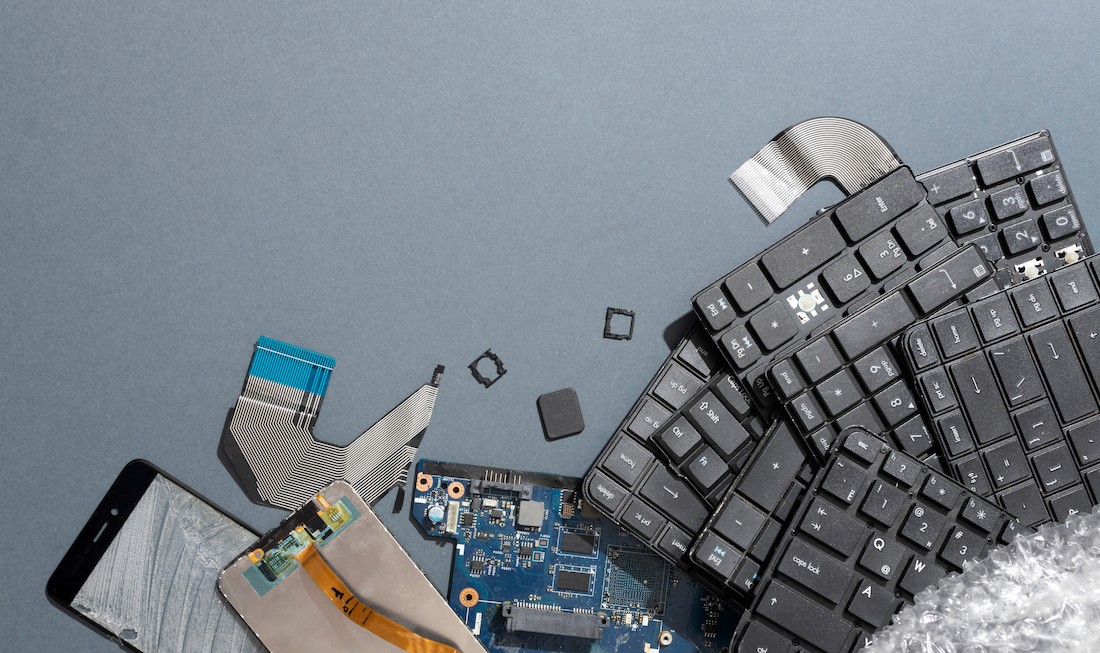Unsurprisingly, recycling electronics wasn’t that major an issue as we simply didn’t consume that much technology. Today, however, the issue of recycling tech is harder to ignore. Do you know how to recycle gadgets?
There was a time when a typical household in the UK probably had one family desktop PC which would last for about 5 years before needing replacement. Now, in that same household, each member might own multiple electronic gadgets – most of which tend to become obsolete or knackered in a lot less than 5 years.
One side effect of the proliferation of consumer electronics in the past 20 years is that we are also increasingly facing a problem about what to do with all this stuff once we no longer need it. Many people start off stuffing desk drawers with their old mobiles, e-book readers, and digital cameras. Then the old desktop goes into the attic. An old laptop joins it there a year later…
Eventually, it reaches the stage where simply stuffing it all away in storage, despite the fact it will never be used or needed again, is no longer workable.
If you’ve reached this stage, you’re probably now realising that all this electrical waste isn’t going to go away. In fact, over the course of our lifetimes we’re going to have to develop habits of disposing of it in a responsible and efficient manner – now is as good a time as any to start!
Here are a few tips on how to recycle old gadgets and deal with old electronics – while also decluttering your house, earning a few quid, protecting the environment from harmful chemicals and helping those less fortunate than yourself in the process!

Generally, the main thing to bear in mind is that, although there is now plenty of online options out there for recycling gadgets, some are rather vague about their environmental credentials, or indeed about what happens to your stuff after to donate/sell it. Obviously, you’d rather avoid people pretending to do you a favour by taking something off your hands for free – before selling it on for a profit which they pocket afterward.
With that in mind, here’s a quick guide to some tried and tested options.
#1 Recycle gadgets and small consumer electronics
Mobiles, smartphones, digital cameras, mp3 players, tablets, e-book readers, etc can be recycled. You have two options here, usually depending on the age of your gadget. If it is quite old then the best you can hope for is that it is disposed off in an environmentally friendly way; that it goes to an underprivileged user who will make good use of it; or that it will fund a charitable cause.
If it’s a newer item, you can also make a few quid in the process. So, for relatively new gadgets, try something like O2’s recycling service. They take various gadgets to recycle (not just mobile phones) regardless of your network. You will receive same day payment for your item which will then be re-sold with all proceeds going directly to O2’s Think Big charity for helping underprivileged young people in the UK.
Alternatively, if your item is older and not one which can earn you any money, it can still generate income for a good cause. Simply donate to the British Heart Foundation (either drop off in store or arrange a collection) and the proceeds from the sale will fund ground-breaking research that saves lives! (see also InKind Direct for another similar option).
#2 Where to recycle laptops and desktop PCs
This is a bit trickier as charities such as the British Heart Foundation cannot take laptops or PCs. Here you’re much better off using the manufacturer’s own recycling program.
Not all offer this but most of the larger ones do (Apple, Dell, Lenovo, HP, LG, Motorola etc). In some cases, you might receive a credit against a future purchase but really the main advantage is that you know your stuff won’t be leaking harmful chemicals out in a landfill site somewhere and will usually be refurbished for use in developing countries.

If you’re keen to maximize income from selling old laptops, there are plenty of online companies which will give you a quote, send you a box for free postage and pay upon reception.
However, in these cases, I recommend taking the time to delete all your old data first (this is probably a good precaution whichever option you choose – same applies to smartphone recycling).
#3 Recycle televisions, games consoles, and computer monitors
These are bulky so the easiest option is to arrange a collection with a charity such as the British Heart Foundation.

Otherwise, Freecycle is a great option in terms of donating things to other people locally. If your items are newer and you’d prefer to generate some cash from them, you can always sell on Amazon or Ebay.
#4 Where can you recycle batteries?
Despite their small size, batteries can be highly destructive if left in ordinary household waste. At the moment in the UK, we recycle only 10% of batteries. They may seem trivial but are actually an absolute priority for recycling – luckily, this is also quite easy to achieve.
Simply allocate a small box somewhere in your home/office for empty batteries, remember to empty old remotes, hearing aids, power tools and the like, and when the container is full (probably once every few months) just take down to your local Asda, Tesco or Staples store or visit the European recycling platform’s excellent website which will tell you the nearest options for depositing recycled batteries.
#5 Recycle gadgets and absolutely anything and everything!
One final option worth considering is to do your own recycling through ‘re-purposing’. Why not look at the materials in front of you in a different way? Can you make something useful from them? Can you recycle gadgets to make something beautiful? It is important to be safe when adapting items (and bear in mind that it will void a warranty and also mean that you won’t be able to re-sell later) – but why not get creative?
Plastic casings from monitors and televisions can be useful containers for everything from fish tanks to cat baskets, while circuit boards and hard drives can actually be quite interesting as ornaments.
If you don’t believe me, take a look at this selection of clever solutions – some focusing on creating fun household objects and others on new technological uses and upcycling. Ultimately, the reality is that at the moment we simply are not as good at recycling technology as we need to be given the fact that we consume more and more of it with each passing year.
Developing good habits when it comes to recycling gadgets is a win-win for everybody involved, including the planet!
Feel free to share any tips of your own below.




